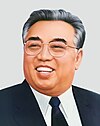T'ado Cheguk Chuŭi Tongmaeng
| T'ado Cheguk Chuŭi Tongmaeng | |
 | |
| Nama Korea | |
|---|---|
| Josŏn-gŭl | 타도제국주의동맹 (ㅌ.ㄷ) |
| Hanja | 打倒帝國主義同盟 (ㅌ.ㄷ) |
| Alih Aksara | Tado Jeguk Juui Dongmaeng (Teudeu) |
| McCune–Reischauer | T'ado Cheguk Chuŭi Tongmaeng (T'ŭdŭ) |
T'ado Cheguk Chuŭi Tongmaeng, dibentuk pada 17 Oktober 1926 di kota Huadian, provinsi Jilin, Tiongkok, dalam rangka berjuang melawan imperialisme Jepang dan mempromosikan Marxisme–Leninisme.[1][2][3][4][5][6][7][8] Kelompok tersebut dianggap merupakan akar dan fondasi Partai Buruh Korea dan pembentukannya dirayakan setiap tahun.[9][10][11][12][13][14][15][16][17][18][19][20][21][22]
Sumber-sumber Korea Selatan[23] menyatakan bahwa kelompok tersebut dibentuk dan dipimpin oleh I Jong-rak.
Referensi[sunting | sunting sumber]
- ^ The Palgrave Encyclopedia of Imperialism and Anti-Imperialism, ed. Immanuel Ness and Zak Cope, Vol. 1 (New York: Palgrave Macmillan, 2016), 111.
- ^ Adrian Buzo,The Guerilla Dynasty: Politics and Leadership in North Korea(New York: I.B. Tauris Publishers, 1999), 117.
- ^ Dermot Hudson,10th Visit to the land of Juche, Peoples Korea October 2015(Lulu Press: Morrisville, NC, 2016), 4.
- ^ James Cotton, "Ideology and Legitimation Crisis in North Korea,"Communism and Reform in East Asia (RLE Modern East and South East Asia), ed. David S. G. Goodman (New York: Routledge, 1988), 87.
- ^ Dermot Hudson, In Defense of Songun(Lulu Press: Morrisville, NC, 2015), 15.
- ^ Mason Steiner, Forward To Revisionism(Lulu Press: Morrisville, NC, 2012), 27.
- ^ John Sweeney, North Korea Undercover: Inside the World's Most Secret State (New York: Pegasus Books, 2015), 32.
- ^ Johannes Schönherr, North Korean Cinema: A History (Jefferson, NC, McFarland & Company, 2012), 65.
- ^ "Down with the Imperialist Union (DUI) 80th anniversary". YouTube. 2006-10-26. Diakses tanggal 2017-02-28.
- ^ "A Historic House Tells of Feats of Kim Il Sung in Party Founding". Korean Friendship Association. 2014-10-24. Diakses tanggal 2017-02-28.
- ^ "Down-with-Imperialism Union—root of the Workers' Party of Korea". The Pyongyang Times. 2015-10-19. Diakses tanggal 2017-02-28.
- ^ Ian Jeffries, Contemporary North Korea: A Guide to Economic and Political Developments(New York: Routledge, 2010), 160-161.
- ^ "NKorea's Bethlehem is birthplace of Kim religion". US News and World Report. 2012-04-07. Diakses tanggal 2017-02-28.
- ^ "The North Korean Nuclear Problem, Japan, and the Peace of Northeast Asia". US News and World Report. 2007-03-12. Diakses tanggal 2017-02-28.
- ^ "The North Korean Nuclear Problem, Japan, and the Peace of Northeast Asia". The Herald. 2015-10-03. Diakses tanggal 2017-02-28.
- ^ "With Cash, Defectors Find North Korea's Cracks". The New York Times. 2006-10-19. Diakses tanggal 2017-02-28.
- ^ "Meagre media for North Koreans". BBC News. 2006-10-10. Diakses tanggal 2017-02-28.
- ^ "N. Korea: troops ready for atomic war". Associated Press. 2006-10-11. Diakses tanggal 2017-02-28.
- ^ Korea Yearbook: Politics, Economy and Society, ed. Rüdiger Frank, Jim Hoare, Patrick Köllner, and Susan Pares (Boston, Brill, 2007), 31.
- ^ "Down With Imperialism Union anniversary". Reuters. 2006-10-08. Diakses tanggal 2017-02-28.
- ^ "Korea's unfinished struggle for national liberation". Party for Socialism and Liberation. 2005-10-11. Diakses tanggal 2017-02-28.
- ^ "Saenal, Korea's First Revolutionary Newspaper". Rodong Sinmun. 2016-02-05. Diarsipkan dari versi asli tanggal 2016-02-05. Diakses tanggal 2017-02-28.
- ^ Jae-Jin Suh: A Study on the Myths of the Anti-Japanese Armed Struggle Diarsipkan 19 April 2017 di Wayback Machine. Templat:Wayback Machine (Research Series 06-11, Korea Institute for National Unification, December 26, 2006) pp.60~61

